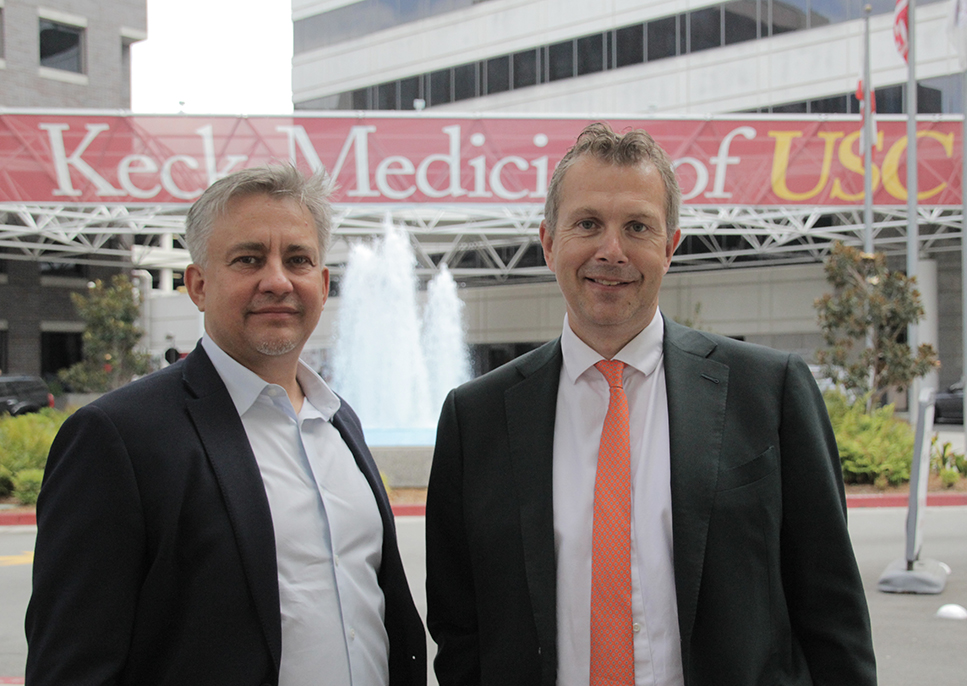
It might start with a shortness of breath that’s easily dismissed as getting older or needing more exercise. But for the nearly 3 million patients with idiopathic pulmonary fibrosis (IPF), this subtle symptom rapidly worsens into a suffocating inability to breathe, often leading to a dangerous elevation in pulmonary artery pressure, related heart attacks or fatal respiratory failure within three to five years of diagnosis. USC physician-scientists Denis Evseenko and Toby Maher hope to offer these patients a better prognosis by developing a regenerative drug to block the cells that promote fibrosis, or scarring, in the lungs, with support from a five-year $3.2 million grant from the National Institute on Aging, part of the National Institutes of Health (NIH).
The IPF project will define one of the major research directions of the USC Parris Longevity Accelerator, led by Evseenko and founded with a $10 million gift from R. Rex and Carrol Parris to find treatments for age-related conditions, ranging from heart disease to neurodegeneration to osteoarthritis to IPF.
“We’re trying to target these major age-related diseases that have no good solutions,” said Evseenko, professor of orthopaedic surgery, and stem cell biology and regenerative medicine, vice-chair of research for orthopaedic surgery, and J. Harold and Edna LaBriola Chair in Genetic Orthopedic Research at the Keck School of Medicine of USC.
Evseenko has already developed two drug-like molecules designed to stop immune cells and small blood vessels from initiating the cellular stress response that triggers inflammation and fibrosis. By blocking inflammation and fibrosis, these drug-like molecules promote a healthier environment conducive to regeneration.
To develop these drug candidates for IPF, Evseenko is teaming up with Maher, who is a professor of clinical medicine and director of interstitial lung Disease at the Keck School of Medicine. An experienced pulmonologist recently recruited to the USC Hastings Center for Pulmonary Research, Maher has a biorepository of patient lung specimens and has been involved in more than 100 clinical trials for IPF and other fibrotic lung diseases.
“A lot of times people think that regenerative medicine is more about replacing the right cells,” said Evseenko, who is also a member of the Eli and Edythe Broad Center for Regenerative Medicine and Stem Cell Research at USC, and the chair of the advisory board of the USC+CHLA Alpha Clinic, which was established by an $8 million grant from the California Institute for Regenerative Medicine (CIRM) to advance cell and gene therapies to patients. “In reality, it’s often a lot more important to slow down the wrong cells, such as the ones that promote fibrotic scar tissue to overtake vital organs as we age. That’s why therapeutic drugs that block these fibro-inflammatory cascades are another way of promoting regeneration, and letting organs naturally heal.”
Through their collaboration, the team will test the safety and therapeutic potential of the two drug-like molecules in animals and human cells, and develop the most effective one into an oral pill—ideally ready for human clinical trials by the time the grant concludes in five years.
Currently, there are only two approved drugs to slow IPF progression, pirfenidone and nintedanib, but they cannot reverse lung damage from the disease, and they also can cause significant side effects.
“If our new regenerative therapy not only slows but also reverses lung damage, it will be a potential gamechanger for patients with IPF, which is the most common form of pulmonary fibrosis,” said Maher.
By drawing upon Evseenko’s background in regenerative medicine and Maher’s experience in the cell biology of fibrotic lung disease and clinical pulmonology, the project leverages USC’s strength as an academic medical center, bridging research with clinical translation and care.
“This project exemplifies how discovery research and clinical medicine inform and amplify each other at USC and Keck Medicine,” said Steven D. Shapiro, Senior Vice President for Health Affairs for USC Health. “Our physician-scientists are harnessing the rapid advances in regenerative medicine to innovate next-generation solutions for IPF and other diseases of aging, and to provide the best possible medical care for patients and communities.”
